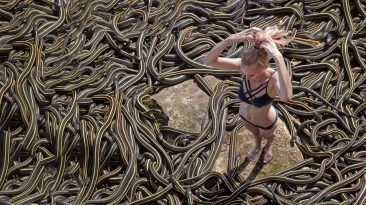Hoarders. They can’t bear to throw anything away. They pile up stuff everywhere, cluttering every space until they can’t move anymore. What if we could flip a switch in people’s brains, so they would never want to throw anything away? Would hoarding impact our economy? Would we need to build bigger homes? How would you organize all your garbage?
Hoarding is a disorder, and it’s no joke. It’s associated with perfectionism and a fear of making wrong decisions. And it can drag people into depression, anxiety, attention-deficit hyperactivity disorder, and alcoholism. Hoarding can cause problems in relationships. And it creates health and safety concerns, including fire and tripping hazards.
Studies have linked hoarding to abnormal activity in specific areas of the brain’s cortex. The brain isn’t able to decide how important or relevant items are, including whether of not to hold on to garbage. And keeping garbage in your home would harm your health. Accumulating garbage could lead to bacteria, viruses, diseases, and infestations.
Yuck, we don’t want to become hoarders. But what if all the world’s governments passed a law stating that we had to keep everything we buy? Forever. No more garbage collection, burning, or dumping stuff. Take this box of macaroni and cheese. It feeds you for just one meal, but you would be stuck with the box and the plastic bag for the rest of your life. You might think twice about buying it.
How would keeping everything impact your habits? If you had to keep everything you bought, you’d need to become more thoughtful, resourceful, and healthy. You might say goodbye to plastic bags and choose reusable shopping bags. And restaurants would offer reusable takeaway containers, or people might need to bring their own.
People wouldn’t want single-use plastics, and the packaging industry would have to adapt or die. It’s likely that we would consume fresh food more often. That would be good for our oceans, landfills, and the environment as a whole All your bills, letters, and mail would be written and delivered electronically. You’d probably keep your favorite books, and maybe you’d give away the rest. New books would only be available in electronic formats.
The repair industry would skyrocket, and so would “do it yourself” activities. Imagine making your kitchen, or building that deck you always wanted for the backyard. People might start borrowing or trading goods instead of buying new. Is there any chance you have a mini-refrigerator? No? Ok.
We wouldn’t be as obsessed with upgrading our homes and buying new things. And we might end up saving money that we could spend on experiences instead of things. We might also build bigger houses to accommodate more stuff. And why not be creative and use our garbage and leftover items to do that?
In 2014, researchers at the University of Brighton built a two-story home, and 85% of it was made from waste, including bicycle inner tubes, VHS tapes, and even used toothbrushes. Are you still thinking about how to get rid of your old stuff? Or maybe you really want to buy some new clothes? For many people, shopping feels good. Sometimes, it makes their day. But let’s be honest.
You likely wear 20% of your wardrobe 80% of the time. And that’s true for almost everything we buy. As consumers we are responsible for more than 60% of greenhouse gas emissions and up to 80% of the world’s water use. And we know what that’s doing to the environment.
We could change our economies so they’re not based on consumerism, or buying new goods. And we could make better use of what we already have. That could change our entire world for the better. Instead of buying Christmas trees and throwing them away each year, what would happen if we grow our Christmas trees?
Sources
- “What Is Hoarding Disorder?”. 2022. psychiatry.org.
- “Consumerism”. Adam Hayes. 2021. Investopedia. investopedia.com.
- “Inside A Hoarder’s Brain: Why They Can’t Ditch Their Stuff”. Stephanie Pappas. 2012. livescience.com.
- “Why Does Shopping Feel So Good?”. Bryan Borzykowski. 2015. bbc.com.
- “‘Throwing Things Out Gives You Time To Look After Yourself’ – How To Get Better At Decluttering”. Sirin Kale. 2018. theguardian.com.


























